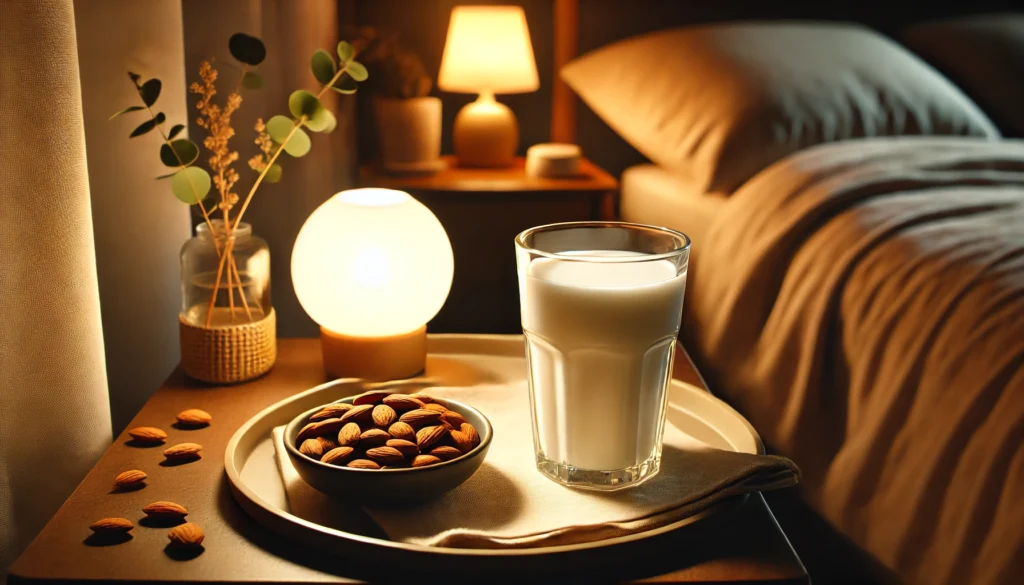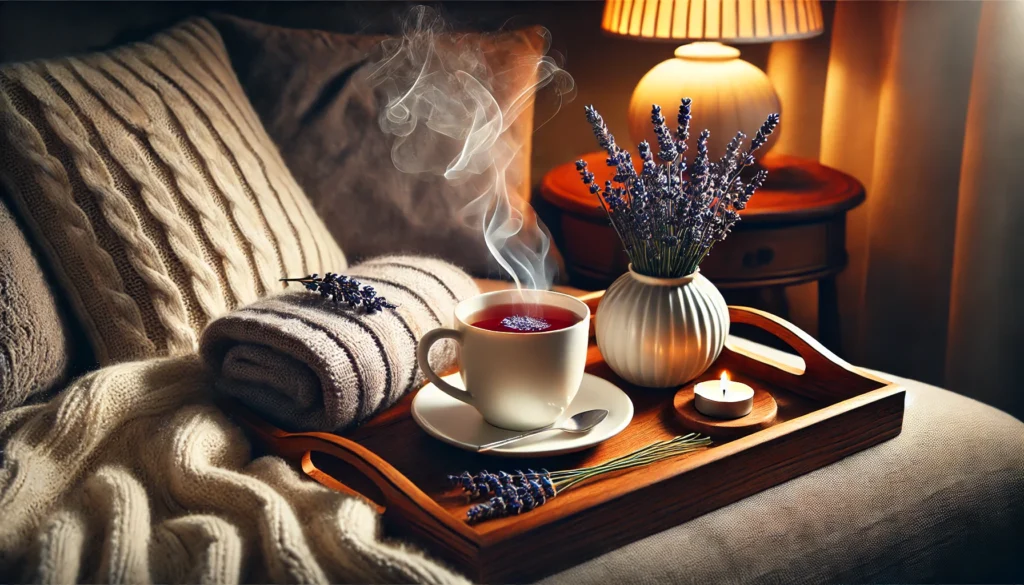In today’s fast-paced world, achieving a good night’s sleep can often feel elusive. Amidst the hustle and bustle of daily life, winding down and preparing for restful slumber is essential for overall health and well-being. One effective strategy to enhance sleep is incorporating calming beverages into your nighttime routine. These drinks not only soothe the mind but also contain properties that can help promote sleep. In this article, we’ll explore some of the best drinks to enjoy before bed, backed by science and tradition alike.
You May Also Like: Essential Vitamins for Better Sleep Quality
The Science of Sleep and Beverages
Before diving into specific drinks, it’s important to understand the role beverages can play in sleep. Various compounds found in drinks can influence neurotransmitters in the brain, impacting sleep cycles and relaxation. For instance, the amino acid tryptophan is a precursor to serotonin and melatonin, hormones that regulate sleep. Similarly, certain minerals like magnesium are known for their calming effects on the nervous system.
Understanding Neurotransmitters and Sleep
Neurotransmitters are chemical messengers that play critical roles in sending signals across the brain. These chemicals, like serotonin and dopamine, can affect mood, arousal, and sleep. By consuming beverages that influence these neurotransmitters, you may help regulate your sleep patterns. For example, drinks rich in tryptophan can help increase serotonin levels, thereby promoting a sense of calmness.
The Role of Hormones in Sleep Regulation
Hormones such as melatonin play a crucial role in sleep regulation. Melatonin is often referred to as the “sleep hormone” because it helps control your sleep-wake cycle. Certain beverages contain compounds that can naturally boost melatonin production, potentially aiding in sleep onset and quality. Understanding how these hormones interact with your body can help you make informed choices about your nighttime drinks.
Minerals and Their Calming Effects
Minerals like magnesium are essential for muscle relaxation and nerve function. Magnesium deficiency is often linked to poor sleep quality and insomnia. Incorporating magnesium-rich drinks into your diet can help calm the nervous system and prepare your body for rest. This mineral works by regulating neurotransmitters and maintaining healthy circadian rhythms, crucial for a restful night’s sleep.
The Impact of Caffeine and Alcohol
While some drinks promote sleep, others can hinder it. Caffeine and alcohol are two substances often found in beverages that can disrupt sleep. Caffeine acts as a stimulant, interfering with sleep cycles, while alcohol, although initially sedative, can lead to fragmented sleep. Understanding the impact of these substances can help you make better choices when selecting your evening beverages.

Drinks to Help You Fall Asleep
Almond Milk: A Nutritious Nightcap
One question that frequently arises is, “Does almond milk make you sleep?” Almond milk is rich in magnesium and tryptophan, both of which can aid in sleep induction. Magnesium acts as a natural muscle relaxant, easing tension and preparing the body for rest. Additionally, almond milk is lactose-free, making it a suitable option for those with dairy sensitivities.
The Benefits of Magnesium in Almond Milk
Magnesium plays an essential role in sleep by activating the parasympathetic nervous system, which helps your body calm down. Almond milk is a valuable source of magnesium, which can help improve sleep quality by reducing stress and anxiety levels. The presence of this mineral in almond milk makes it a favorable choice for a bedtime drink, especially for those who struggle with insomnia.
Lactose-Free Alternative for Better Sleep
For individuals with lactose intolerance, finding a suitable nighttime drink can be challenging. Almond milk provides a lactose-free alternative that still offers the benefits of tryptophan and magnesium. This characteristic makes almond milk an inclusive option for diverse dietary needs, ensuring everyone can enjoy a calming drink before bed.
The Role of Tryptophan in Almond Milk
Tryptophan is an amino acid that serves as a precursor to serotonin and melatonin, both vital for sleep regulation. Almond milk contains tryptophan, which can help boost serotonin levels, creating a calming effect on the brain. By increasing melatonin production, almond milk can help regulate sleep patterns and improve overall sleep quality.
Herbal Teas: Nature’s Sleep Aids
Herbal teas have long been revered for their soothing properties. Chamomile tea, in particular, is celebrated for its mild sedative effects, attributed to the antioxidant apigenin, which binds to specific receptors in the brain to decrease anxiety and initiate sleep. Another excellent choice is valerian root tea, which has been used since ancient times to treat insomnia and nervousness.
Chamomile Tea: The Classic Sleep Aid
Chamomile tea is one of the most popular herbal teas known for its calming effects. The presence of apigenin, a powerful antioxidant, contributes to its sedative properties by binding to receptors in the brain that help decrease anxiety. Drinking chamomile tea before bed can create a soothing ritual, signaling to your body that it’s time to wind down.
Valerian Root Tea: Ancient Remedy for Modern Sleep
Valerian root has been used for centuries to treat sleep disorders and anxiety. The compounds in valerian root interact with gamma-aminobutyric acid (GABA) receptors in the brain, promoting relaxation and reducing sleep latency. Incorporating valerian root tea into your nightly routine can help improve sleep quality and duration, making it a valuable addition to your sleep-promoting beverage repertoire.
The Calming Effects of Passionflower Tea
Passionflower tea is another excellent herbal option for enhancing sleep. This tea works by increasing GABA levels in the brain, which can help reduce anxiety and induce relaxation. Consuming passionflower tea before bed can aid in calming the mind, making it easier to drift off into a peaceful sleep.
Tart Cherry Juice: A Melatonin Marvel
When considering what juice helps you sleep, tart cherry juice stands out. This beverage contains naturally occurring melatonin, the hormone responsible for regulating sleep-wake cycles. Studies have shown that consuming tart cherry juice can improve sleep duration and quality, making it a potent drink for those struggling with insomnia.
The Science Behind Tart Cherry Juice and Sleep
Tart cherry juice is rich in melatonin, a hormone that regulates the sleep-wake cycle. Research indicates that consuming tart cherry juice can significantly increase melatonin levels, resulting in improved sleep duration and efficiency. This natural source of melatonin makes tart cherry juice a powerful ally for those experiencing sleep disturbances.
Antioxidant Properties of Tart Cherry Juice
In addition to its melatonin content, tart cherry juice is packed with antioxidants that offer numerous health benefits. These antioxidants can help reduce inflammation and oxidative stress, contributing to better overall health and improved sleep quality. By incorporating tart cherry juice into your nightly routine, you can enjoy both its sleep-promoting and health-enhancing properties.
How to Incorporate Tart Cherry Juice into Your Routine
Incorporating tart cherry juice into your bedtime routine is simple and effective. Consuming a small glass of tart cherry juice about an hour before bed can help maximize its sleep-promoting effects. To avoid excess sugar intake, opt for unsweetened tart cherry juice or dilute it with water.

Drinks to Help You Fall Asleep
Warm Milk: A Time-Honored Tradition
The classic remedy of warm milk before bed is not just an old wives’ tale. Milk contains tryptophan, and when heated, it becomes even more soothing, providing a comforting ritual that signals the body it’s time to sleep. For those who are lactose intolerant, lactose-free options or plant-based milks enriched with tryptophan can be used as alternatives.
The Comforting Ritual of Warm Milk
Warm milk has been a go-to sleep aid for generations, offering both psychological and physiological benefits. The act of drinking something warm can have a calming effect on the body, helping to lower stress levels. This simple ritual can create a sense of comfort and routine, signaling to your mind and body that it’s time to relax and prepare for sleep.
The Science of Tryptophan in Warm Milk
Milk is a natural source of tryptophan, an amino acid that promotes the production of serotonin and melatonin. When you consume warm milk, the tryptophan content helps increase these hormones, supporting better sleep. The gentle warmth of the milk can also aid in digestion, allowing your body to focus on rest.
Lactose-Free and Plant-Based Alternatives
For those who are lactose intolerant or prefer plant-based options, there are several alternatives to traditional cow’s milk. Lactose-free milk and plant-based milks like soy or oat milk can be enriched with tryptophan, offering similar sleep-inducing benefits. These alternatives ensure that everyone can enjoy the soothing effects of a warm milk beverage before bed.
Lavender Infusion: Aromatherapy in a Cup
Lavender is well-known for its calming scent, often used in aromatherapy to promote relaxation. However, lavender can also be consumed as a tea. The infusion has mild sedative properties and can help reduce anxiety and improve sleep quality.
The Calming Scent of Lavender
Lavender is widely used in aromatherapy for its ability to promote relaxation and reduce stress. Its calming scent is believed to slow down the nervous system, creating a sense of tranquility. Drinking lavender tea allows you to experience these benefits internally, providing a holistic approach to relaxation and improved sleep.
Lavender Tea: A Gentle Sleep Aid
Lavender tea offers a gentle and soothing way to enhance sleep quality. The compounds in lavender tea can help reduce anxiety and promote relaxation, making it easier to fall asleep. Incorporating lavender tea into your nightly routine can create a peaceful ritual that supports better sleep.
Combining Lavender with Other Herbs
For an enhanced sleep-promoting effect, consider combining lavender tea with other calming herbs like chamomile or valerian. These combinations can create a more potent blend, maximizing the benefits of each herb. Experimenting with different herbal blends can help you discover the most effective combination for your unique sleep needs.
Lemon Balm Tea: Stress-Reducing Elixir
Lemon balm, a member of the mint family, is another herbal tea option that can aid sleep. Known for its mild sedative effects and ability to reduce stress, lemon balm tea helps in calming the mind and facilitating sleep. Research indicates that lemon balm can significantly improve sleep patterns, especially when combined with other calming herbs like chamomile or valerian.
The Relaxing Properties of Lemon Balm
Lemon balm has been used for centuries to reduce stress and promote relaxation. The compounds in lemon balm interact with GABA receptors in the brain, helping to calm the nervous system. Drinking lemon balm tea before bed can create a soothing effect, making it easier to drift off to sleep.
Lemon Balm and Its Impact on Sleep Quality
Research has shown that lemon balm can significantly improve sleep patterns and quality. By reducing anxiety and stress levels, lemon balm helps create an optimal environment for sleep. Incorporating lemon balm tea into your bedtime routine can be an effective way to enhance sleep quality and duration.
Combining Lemon Balm with Other Herbs
For a more potent sleep-promoting effect, consider combining lemon balm tea with other calming herbs like chamomile or valerian. These combinations can enhance the benefits of each herb, creating a powerful blend that supports relaxation and sleep. Experimenting with different herbal blends can help you find the most effective combination for your sleep needs.

Modern Trends and Future Implications
As wellness trends evolve, so do the methods to enhance sleep quality. The rise of adaptogenic drinks, which include ingredients like ashwagandha and reishi mushroom, demonstrate a growing interest in beverages that support relaxation and stress reduction. These adaptogens work by modulating the body’s stress response, paving the way for better sleep.
The Rise of Adaptogenic Beverages
Adaptogens are natural substances that help the body adapt to stress and promote balance. The popularity of adaptogenic beverages has surged as people seek natural ways to enhance their sleep and well-being. Ingredients like ashwagandha and reishi mushroom are commonly found in these drinks, offering stress-reducing and sleep-enhancing benefits.
The Role of Adaptogens in Sleep Enhancement
Adaptogens work by influencing the body’s stress response, helping to promote relaxation and balance. These effects can lead to improved sleep quality and duration. By incorporating adaptogenic drinks into your nightly routine, you can support your body’s natural ability to cope with stress and enhance your sleep.
The Future of Sleep-Enhancing Beverages
As interest in natural sleep aids continues to grow, the market for sleep-enhancing beverages is expected to expand. Future innovations may include new blends of herbs, adaptogens, and nutrients designed to support relaxation and sleep. Staying informed about these trends can help you discover new options for improving your sleep quality.
Ready-to-Drink Solutions for Modern Lifestyles
The convenience of ready-to-drink sleep beverages makes them an attractive option for busy individuals. These products often contain a blend of herbs, amino acids, and vitamins specifically formulated to promote relaxation and sleep. As more people seek effective and convenient ways to enhance their sleep, the availability of these solutions is likely to increase.
Balancing Science with Practical Advice
While the science behind sleep-inducing drinks is compelling, it’s essential to balance scientific facts with practical advice. Consider these tips when incorporating calming beverages into your nightly routine:
Timing is Key: When to Consume Sleep-Promoting Drinks
To maximize the benefits of sleep-promoting beverages, timing is crucial. It’s generally recommended to consume your chosen drink at least 30 minutes before bedtime. This allows enough time for the active compounds to take effect and help prepare your body for sleep.
Moderation Matters: Avoiding Overconsumption
While calming beverages can aid in sleep, it’s important to avoid overconsumption. Drinking too much liquid before bed can lead to frequent nighttime awakenings and disrupted sleep. Aim for a moderate amount, ensuring you reap the benefits without compromising your rest.
Personal Preference: Choosing the Right Drink for You
Selecting a sleep-promoting beverage should align with your personal taste preferences and dietary needs. Whether you prefer herbal teas, warm milk, or adaptogenic drinks, choose a beverage that you enjoy and that fits within your lifestyle. This personalization can enhance the effectiveness of your sleep routine.
Creating a Relaxing Bedtime Ritual
Incorporating calming drinks into a broader bedtime ritual can enhance their effectiveness. Consider pairing your chosen beverage with activities like reading, meditation, or gentle stretching. Creating a holistic wind-down routine can signal to your body that it’s time to relax and prepare for sleep.
Conclusion
Incorporating calming drinks into your bedtime routine can be an effective way to enhance sleep quality. From the traditional allure of warm milk to the modern embrace of adaptogenic elixirs, there is a wide range of beverages to explore. By understanding the science behind these drinks and tailoring your choices to your preferences, you can cultivate a nightly ritual that not only aids in sleep but also enriches your overall wellness journey. So, the next time you wonder what to drink before bed to help sleep, reach for one of these soothing options and drift into restful slumber.
Further Reading:
Is It Healthy To Drink Water Before Bed?
The Best and Worst Beverages to Drink Before Bedtime
Important Note: The information contained in this article is for general informational purposes only, and should not be construed as health or medical advice, nor is it intended to diagnose, prevent, treat, or cure any disease or health condition. Before embarking on any diet, fitness regimen, or program of nutritional supplementation, it is advisable to consult your healthcare professional in order to determine its safety and probable efficacy in terms of your individual state of health.
Regarding Nutritional Supplements Or Other Non-Prescription Health Products: If any nutritional supplements or other non-prescription health products are mentioned in the foregoing article, any claims or statements made about them have not been evaluated by the U.S. Food and Drug Administration, and such nutritional supplements or other health products are not intended to diagnose, treat, cure, or prevent any disease.


